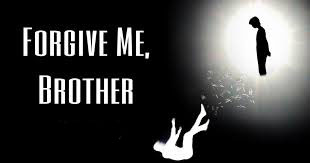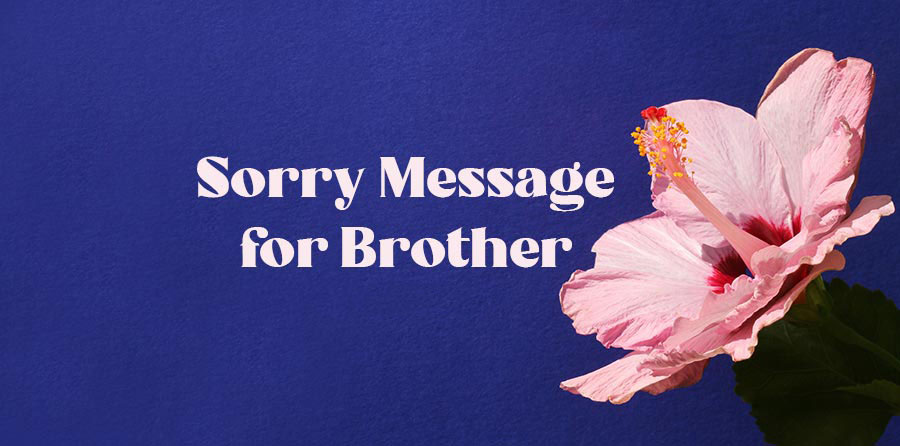Apologizing to your brother can be a difficult but necessary step in repairing a damaged relationship. Here are some reasons why apologizing to your brother is important
Shows Respect: Apologizing demonstrates that you value your brother and the relationship you have with him. By taking responsibility for your actions and expressing regret, you show your brother that you respect him and the bond you share.
Helps to Heal Wounds: Apologizing is a crucial part of the healing process. When you apologize, you acknowledge the pain that you have caused your brother and show that you are committed to making things right. This can help to alleviate the hurt and anger that your brother may be feeling.
Restores Trust: Apologizing can help to rebuild trust. When you apologize, you are acknowledging that you made a mistake and that you are committed to not repeating it. This can help your brother to trust you again and feel more comfortable in your relationship.
Strengthens Communication: Apologizing can open the lines of communication. When you apologize, you are inviting your brother to talk about what happened and how he feels. This can create an opportunity for both of you to share your perspectives, work through any misunderstandings, and strengthen your relationship.
Sets a Positive Example: Apologizing sets a positive example for others. When you apologize to your brother, you are demonstrating that it is important to take responsibility for your actions and to make things right when you have done something wrong. This can inspire others to do the same in their own relationships.
In summary, apologizing to your brother is an important step in repairing a damaged relationship. It shows respect, helps to heal wounds, restores trust, strengthens communication, and sets a positive example for others.
Table of Contents
Forgive Me Brother Quotes for Sincere Apologies
Here are some “Forgive Me Brother” quotes that you can use to make a sincere apology to your brother:
“I’m sorry for any pain or hurt that I’ve caused you, my dear brother. I hope you can find it in your heart to forgive me.”
“I know that I’ve made mistakes and I’m truly sorry for any pain that I’ve caused you. Please forgive me, brother.”
“I never meant to hurt you, brother. Please accept my sincerest apologies and know that I will do everything in my power to make things right.”
“I’m sorry for any hurtful words or actions that I’ve done. I hope you can find it in your heart to forgive me and that we can move forward in our relationship.”
“Brother, I want you to know that I am truly sorry for my actions. I know that I have let you down and I hope that you can find it in your heart to forgive me.”
“I am deeply sorry for any pain that I’ve caused you, brother. Please know that I regret my actions and that I will do everything in my power to make amends.”
“I apologize from the bottom of my heart for any hurt that I’ve caused you, brother. I hope that we can find a way to move forward and repair our relationship.”
“My dear brother, I know that I’ve made mistakes and I am truly sorry for any pain that I’ve caused you. Please forgive me and let’s work together to heal our relationship.”
“I want to apologize for my actions and for any hurt that I’ve caused you, brother. I hope that we can move forward and rebuild our bond.”
“Brother, please know that I am truly sorry for any pain that I’ve caused you. I hope that we can find a way to mend our relationship and move forward with love and understanding.”
In summary, using a “Forgive Me Brother” quote can be a powerful way to make a sincere apology and show your brother that you are committed to repairing your relationship.
Status Updates to Ask for Forgiveness from Your Brother
Here are some status updates that you can use to ask for forgiveness from your brother:
“I want to apologize to my brother for any hurt that I’ve caused. I hope we can work together to mend our relationship.”
“Dear brother, I want to say sorry for my mistakes and the pain I’ve caused you. I hope you can forgive me and we can move forward together.”
“I want to take this opportunity to ask for forgiveness from my brother for any wrongs that I’ve done. I hope we can find a way to heal our relationship.”
“To my dear brother, I am sorry for any hurt that I’ve caused. I hope we can talk and work through our issues together.”
“I know that I’ve made mistakes and hurt my brother. I want to apologize and ask for forgiveness. I hope we can find a way to rebuild our relationship.”
“I want to take this moment to apologize to my brother for any pain that I’ve caused. I hope that we can find a way to move past this and strengthen our relationship.”
“To my beloved brother, I want to say sorry for any mistakes that I’ve made. I hope you can forgive me and that we can work together to repair our bond.”
“I am truly sorry for any harm that I’ve caused to my brother. I hope we can find a way to reconcile and move forward in our relationship.”
“Dear brother, I want to take responsibility for my actions and apologize for any hurt that I’ve caused. I hope that we can work together to rebuild our relationship.”
“I know that I’ve made mistakes and caused pain to my brother. I want to apologize and ask for his forgiveness. I hope we can move forward together with love and understanding.”
In summary, using a status update to ask for forgiveness from your brother can be a powerful way to show your sincerity and commitment to repairing your relationship. It can also create an opportunity for communication and healing.
Heartfelt Messages to Say Sorry to Your Brother
Here are some heartfelt messages that you can use to say sorry to your brother:
“Dear brother, I know that my actions have hurt you deeply. I want you to know that I am truly sorry for my mistakes and that I will do everything in my power to make things right between us. I love you.”
“My dear brother, I want to take this opportunity to apologize for any hurt that I’ve caused you. I know that I’ve made mistakes, and I hope that we can find a way to move forward with love and understanding. Please forgive me.”
“I never meant to hurt you, brother. I am deeply sorry for my actions and for any pain that I’ve caused you. I hope that we can find a way to mend our relationship and move forward with love and trust.”
“Dear brother, I want to say sorry for my mistakes and for any hurt that I’ve caused you. I hope that we can work together to heal our relationship and build a stronger bond between us. I love you and I’m here for you.”
“I want to apologize from the bottom of my heart for any harm that I’ve caused you, brother. I hope that we can find a way to forgive each other and move forward in our relationship. You mean everything to me.”
“To my dear brother, I am deeply sorry for any pain that I’ve caused you. I hope that we can find a way to mend our relationship and build a better future together. Please know that I am here for you and that I love you.”
“I want to take responsibility for my actions and apologize to my brother for any hurt that I’ve caused. I know that I’ve let you down and I hope that we can find a way to move forward with forgiveness and understanding. I love you.”
“Dear brother, I want you to know that I am truly sorry for any mistakes that I’ve made and for any pain that I’ve caused you. I hope that we can find a way to reconcile and build a stronger relationship together. Please forgive me.”
“I am deeply sorry for any hurtful words or actions that I’ve done, brother. I hope that we can find a way to heal our relationship and move forward with love and trust. Please know that I am here for you and that I care deeply about you.”
“To my beloved brother, I want to say sorry for any harm that I’ve caused. I hope that we can find a way to forgive each other and move forward with love and understanding. You are always in my thoughts and in my heart.”
In summary, saying sorry to your brother through heartfelt messages can be a powerful way to show your sincerity and commitment to repairing your relationship. It can also create an opportunity for communication and healing.
How to Make Amends and Repair Your Relationship with Your Brother
If you’ve hurt your brother and want to repair your relationship, here are some steps you can take to make amends and move forward:
- Take responsibility for your actions: Acknowledge that you’ve done something wrong and take responsibility for your behavior. This means being willing to admit your mistakes and the harm that you’ve caused.
- Apologize sincerely: Make a heartfelt apology to your brother. Be specific about what you’re apologizing for and express your regret. Avoid making excuses or placing blame.
- Listen to your brother: Be willing to listen to your brother’s feelings and point of view. Try to understand where he’s coming from and why he may be hurt or upset. Show empathy and validation for his feelings.
- Make amends: Take action to make things right. This may involve making a tangible gesture, such as repairing or replacing something you’ve damaged, or offering to do something to make up for your mistake. It may also involve changing your behavior to prevent similar incidents from happening in the future.
- Be patient and persistent: Healing takes time and effort, so be patient and persistent in your efforts to repair your relationship. This may involve having difficult conversations and being willing to address ongoing issues or concerns.
- Communicate openly and honestly: Be willing to communicate openly and honestly with your brother. This means being willing to express your feelings and needs, as well as listening to his. Establishing clear communication can help prevent future misunderstandings and conflicts.
- Maintain the relationship: Once you’ve made amends and repaired your relationship, it’s important to maintain it. This may involve spending time together, checking in with each other regularly, and continuing to communicate openly and honestly.
In summary, repairing your relationship with your brother takes effort, patience, and commitment. By taking responsibility for your actions, making a sincere apology, listening to your brother, making amends, communicating openly and honestly, and maintaining the relationship, you can rebuild trust and strengthen your bond.
Examples of Forgiveness in Literature and Culture
Forgiveness is a powerful and universal theme in literature and culture. Here are some examples of forgiveness in literature and culture:
- The Bible: In the Bible, the story of the prodigal son illustrates the power of forgiveness. The father forgives his son, who had squandered his inheritance, and welcomes him back home with open arms.
- Les Misérables by Victor Hugo: This novel explores the theme of forgiveness and redemption. Jean Valjean, who was imprisoned for stealing a loaf of bread, is shown mercy by a bishop who forgives him and gives him a chance to start a new life. Valjean goes on to become a model citizen and shows forgiveness to his enemy, Javert.
- The Kite Runner by Khaled Hosseini: This novel tells the story of two friends, Amir and Hassan, who are separated by class and ethnicity. Amir betrays Hassan, and the guilt haunts him for years. Eventually, he seeks forgiveness from Hassan’s son, Sohrab, and finds redemption.
- The Tempest by William Shakespeare: This play explores the theme of forgiveness through the character of Prospero. He forgives his brother for betraying him and orchestrating his exile, and forgives his enemies for their attempted coup.
- Gandhi: Mahatma Gandhi is known for his philosophy of non-violence and forgiveness. He advocated for forgiveness as a means of resolving conflicts and promoting peace.
- Nelson Mandela: Nelson Mandela, the former president of South Africa, is another leader who advocated for forgiveness and reconciliation. After spending 27 years in prison, he forgave his oppressors and worked to build a new, more inclusive South Africa.
- The Lion King: This Disney movie explores the theme of forgiveness through the character of Simba. He forgives his uncle, Scar, for killing his father and stealing the throne.
In summary, forgiveness is a universal theme that is explored in literature, culture, and religion. These examples illustrate the power of forgiveness to heal relationships and promote peace.
The Healing Power of Forgiveness in Family Relationships
Forgiveness can be a powerful force in healing family relationships. Here are some ways forgiveness can promote healing:
- Repairing trust: Forgiveness can help to repair broken trust in family relationships. When someone has been hurt by a family member, it can be difficult to trust that person again. Forgiveness can be a first step in rebuilding trust, by acknowledging the harm that was caused and expressing a willingness to move forward.
- Promoting empathy and understanding: Forgiveness requires empathy and understanding. When someone forgives a family member, they are putting themselves in the other person’s shoes and seeing things from their perspective. This can promote greater empathy and understanding, and help family members to see each other in a new light.
- Reducing negative emotions: Holding a grudge or resentment towards a family member can cause negative emotions such as anger, bitterness, and sadness. Forgiveness can help to release these negative emotions and promote feelings of peace and acceptance.
- Strengthening bonds: Forgiveness can help to strengthen bonds between family members. By acknowledging the harm that was caused and expressing a willingness to move forward, family members can develop a deeper sense of connection and understanding.
- Promoting healing: Forgiveness can be a powerful tool in promoting healing in family relationships. When family members forgive each other, they can begin to let go of past hurts and move forward with a renewed sense of hope and optimism.
In summary, forgiveness can be a powerful force in healing family relationships. It can help to repair trust, promote empathy and understanding, reduce negative emotions, strengthen bonds, and promote healing. While forgiveness may not always be easy, it can be a crucial step in promoting peace, harmony, and understanding in family relationships.
Forgiveness and Moving Forward: Tips for Restoring Trust with Your Brother
If you’re seeking forgiveness and hoping to restore trust with your brother, here are some tips that may be helpful:
- Take responsibility for your actions: To rebuild trust, it’s important to take responsibility for your actions and acknowledge the harm you may have caused. This means being honest and transparent about what happened, and avoiding excuses or blaming others.
- Apologize sincerely: A sincere apology can go a long way towards restoring trust. Be specific about what you’re sorry for, and express genuine remorse for any harm caused. Avoid defensive language and focus on how you can make things right.
- Listen actively: Listening actively to your brother can help to rebuild trust. Try to put yourself in his shoes and understand his perspective. Avoid interrupting, and focus on what he’s saying.
- Make amends: If you’ve caused harm, it’s important to make amends. This may mean doing something to make things right, such as offering compensation or taking steps to address the problem. Be proactive and take action to show your brother that you’re committed to making things right.
- Be patient: Restoring trust takes time, so be patient and don’t rush the process. Your brother may need time to heal, and it’s important to respect his boundaries and give him space if he needs it.
- Communicate openly: Open and honest communication is key to restoring trust. Keep the lines of communication open, and be willing to discuss any concerns or issues that arise.
- Follow through on your commitments: If you make commitments to your brother, it’s important to follow through on them. This shows that you’re committed to making things right, and can help to rebuild trust over time.
In summary, restoring trust with your brother requires taking responsibility for your actions, apologizing sincerely, listening actively, making amends, being patient, communicating openly, and following through on your commitments. While it may not be easy, taking these steps can help to promote healing and rebuild trust in your relationship.
When Forgiveness Is Not Enough: Dealing with Deep-Seated Resentment and Conflict
While forgiveness can be a powerful tool in promoting healing and restoring relationships, there are situations where forgiveness alone may not be enough to address deep-seated resentment and conflict. Here are some strategies to consider if you’re struggling to move forward, even after forgiving your brother:
- Seek professional help: If you’re struggling with deep-seated resentment and conflict, seeking the help of a mental health professional may be a good option. A therapist can provide you with tools and strategies to address underlying issues, process your emotions, and improve your communication and relationship skills.
- Practice self-care: Dealing with conflict and resentment can be emotionally draining. Prioritizing self-care, such as exercise, meditation, and time with loved ones, can help you manage your emotions and promote a sense of well-being.
- Set boundaries: If you’re struggling with ongoing conflict with your brother, it may be helpful to set boundaries. This means being clear about what you’re willing and not willing to tolerate, and sticking to those boundaries. For example, you may decide to limit contact with your brother until you’re both in a better place.
- Consider mediation: If you’re struggling to resolve conflict on your own, consider seeking the help of a mediator. A mediator is a neutral third party who can help facilitate communication and negotiation between you and your brother.
- Practice empathy: While it can be difficult to empathize with someone who has hurt you, practicing empathy can help to promote healing and understanding. Try to see things from your brother’s perspective, and avoid demonizing or vilifying him.
- Practice forgiveness, even if it doesn’t lead to reconciliation: Forgiveness can still be a powerful tool in promoting healing, even if it doesn’t lead to reconciliation. By forgiving your brother, you’re releasing yourself from the burden of resentment and promoting your own emotional well-being.
In summary, forgiveness may not always be enough to address deep-seated resentment and conflict. Seeking professional help, practicing self-care, setting boundaries, considering mediation, practicing empathy, and forgiving even if reconciliation is not possible are all strategies to consider if you’re struggling to move forward. Ultimately, it’s up to you to determine what is best for your emotional well-being and your relationship with your brother.
Conclusion: The Transformative Power of Forgiveness in Brotherly Bonds.
Forgiveness can have a transformative power in brotherly bonds, promoting healing, strengthening relationships, and building deeper connections. Here are some ways that forgiveness can transform brotherly bonds:
- Promotes healing: When one brother forgives the other for past hurts, it can promote healing and a sense of closure. It allows both parties to move forward, letting go of resentment and bitterness, and promotes emotional healing.
- Strengthens relationships: Forgiveness can strengthen relationships by promoting trust and intimacy. When one brother forgives the other, it shows a willingness to let go of past hurts and to rebuild the relationship on a foundation of trust and mutual respect.
- Builds empathy and compassion: Forgiveness can build empathy and compassion in brotherly bonds. It allows each brother to see things from the other’s perspective and to understand the underlying emotions and motivations behind past actions.
- Fosters personal growth: Forgiveness can foster personal growth in both brothers. It requires both parties to take responsibility for their actions, to be vulnerable and honest, and to work towards building a better relationship.
- Creates deeper connections: Forgiveness can create deeper connections between brothers, promoting a sense of shared history and experience. By forgiving one another, brothers can create a sense of unity and solidarity, strengthening their bond and building a sense of family.
In summary, forgiveness can have a transformative power in brotherly bonds, promoting healing, strengthening relationships, building empathy and compassion, fostering personal growth, and creating deeper connections. While forgiveness can be difficult, it is a powerful tool for promoting healing and strengthening family bonds.
Apologizing for Specific Transgressions: Examples and Approaches
Apologizing for specific transgressions can be an important step in repairing relationships and promoting forgiveness. Here are some examples and approaches to consider:
- Apologizing for hurting someone’s feelings: If you have hurt your brother’s feelings, it’s important to acknowledge the specific behavior or action that caused the hurt. For example, “I’m sorry for saying those hurtful things. I realize that they were disrespectful and caused you pain. I should have been more considerate of your feelings.”
- Apologizing for breaking a promise: If you have broken a promise to your brother, it’s important to acknowledge the specific promise and the impact of breaking it. For example, “I’m sorry for breaking my promise to be there for you when you needed me. I know that it was important to you, and I feel terrible for letting you down. In the future, I will be more mindful of the commitments I make.”
- Apologizing for lying: If you have lied to your brother, it’s important to acknowledge the specific lie and the impact it had on your relationship. For example, “I’m sorry for lying to you about where I was last night. I know that it was wrong, and it damaged our trust. I want you to know that I will be honest with you in the future, even if it’s difficult.”
- Apologizing for neglecting your brother: If you have neglected your brother, it’s important to acknowledge the specific behavior and the impact it had on your relationship. For example, “I’m sorry for not making time for you lately. I realize that it has caused a strain in our relationship, and I regret not being there for you. In the future, I will make an effort to be more present and available.”
When apologizing for specific transgressions, it’s important to be sincere, take responsibility for your actions, and offer a plan for how you will make things right. It’s also important to listen to your brother’s perspective and be open to feedback. Remember that forgiveness is a process, and it may take time for your brother to fully trust you again. However, by acknowledging specific transgressions and taking responsibility for your actions, you can promote healing and repair your relationship.
The Role of Empathy in Apologizing to Your Brother
Empathy is a crucial component of apologizing to your brother. Empathy involves understanding and being able to relate to your brother’s emotions and experiences. When you apologize with empathy, you show that you care about how your actions have affected your brother and that you are willing to take responsibility for the harm you have caused.
Here are some ways that empathy can play a role in apologizing to your brother:
- Acknowledge your brother’s feelings: When you apologize, take the time to acknowledge your brother’s feelings and the impact that your actions have had on him. Use phrases like “I understand that my actions hurt you” or “I can see how my behavior made you feel.”
- Put yourself in your brother’s shoes: Try to imagine what it would feel like to be in your brother’s position. This can help you understand his perspective and show him that you are genuinely concerned about his feelings.
- Show remorse: Express genuine remorse for your actions and how they have hurt your brother. Use phrases like “I’m truly sorry for what I did” or “I regret my actions and the pain they caused you.”
- Take responsibility: Own up to your actions and take responsibility for what you have done. Don’t make excuses or try to deflect blame onto others.
- Offer a solution: Once you have acknowledged your brother’s feelings and taken responsibility for your actions, offer a solution for relationship and moving forward in a positive way.
- Be patient: It’s important to be patient and understanding as your brother processes his feelings and decides whether or not to forgive you. Remember that forgiveness is a process, and it may take time for your brother to fully trust you again.
By incorporating empathy into your apology, you can demonstrate that you are genuinely sorry for your actions and are committed to repairing your relationship with your brother. This can go a long way in promoting forgiveness and healing, and can help to build a stronger and more positive brotherly bond in the future.







